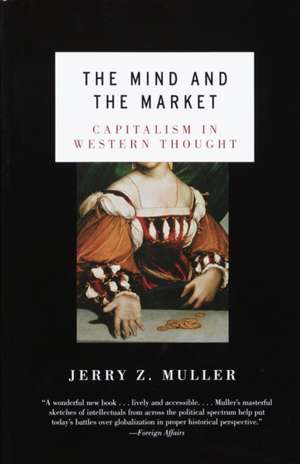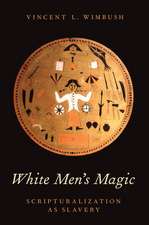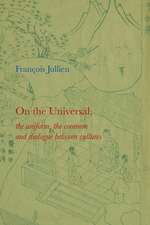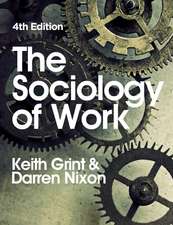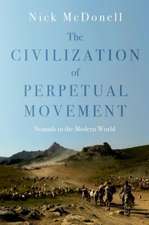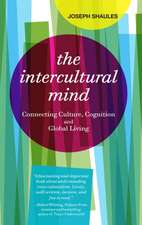The Mind and the Market: Capitalism in Modern European Thought
Autor Jerry Z. Mulleren Limba Engleză Paperback – 31 oct 2003
Ranging across an ideological spectrum that includes Hobbes, Voltaire, Adam Smith, Edmund Burke, Hegel, Marx, and Matthew Arnold, as well as twentieth-century communist, fascist, and neoliberal intellectuals, historian Jerry Muller examines a fascinating thread of ideas about the ramifications of capitalism and its future implications. This is an engaging and accessible history of ideas that reverberate throughout everyday life.
Preț: 133.92 lei
Nou
Puncte Express: 201
Preț estimativ în valută:
25.63€ • 26.44$ • 21.69£
25.63€ • 26.44$ • 21.69£
Carte disponibilă
Livrare economică 12-26 februarie
Preluare comenzi: 021 569.72.76
Specificații
ISBN-13: 9780385721660
ISBN-10: 0385721668
Pagini: 487
Dimensiuni: 135 x 204 x 23 mm
Greutate: 0.39 kg
Editura: Anchor Books
ISBN-10: 0385721668
Pagini: 487
Dimensiuni: 135 x 204 x 23 mm
Greutate: 0.39 kg
Editura: Anchor Books
Notă biografică
Jerry Z. Muller is Professor of History at the Catholic University of America in Washington, D.C. He is the author of The Other God That Failed: Hans Freyer and the Deradicalization of German Conservatism, Adam Smith in His Time and Ours: Designing the Decent Society, and Conservatism: An Anthology of Social and Political Thought from David Hume to the Present. He lives in Silver Spring, Maryland.
Extras
Chapter One
Historical Backdrop:
Rights, Righteousness, and Virtue
"Those who accumulate possessions without end and without measure, those who are constantly adding new fields and new houses to their heritage; those who hoard huge quantities of wheat in order to sell at what to them is the opportune moment; those who lend at interest to poor and rich alike, think they are doing nothing against reason, against equity, and finally against divine law, because, as they imagine, they do no harm to anyone and indeed benefit those who would otherwise fall into great necessity.... [Yet] if no one acquired or possessed more than he needed for his maintenance and that of his family, there would be no destitute in the world at all. It is thus this urge to acquire more and more which brings so many poor people to penury. Can this immense greed for acquisition be innocent, or only slightly criminal?"
-Father Thomassin, traité de négoce et de l'usure, 1697
"Trade, without doubt, is in its nature a pernicious thing; it brings in that wealth which introduces luxury; it gives rise to fraud and avarice, and extinguishes virtue and simplicity of manners; it depraves a people, and makes way for that corruption which never fails to end in slavery, foreign or domestic. Lycurgus, in the most perfect model of government that was ever framed, did banish it from his commonwealth."
-Charles Davenant, "Essay upon the probable methods of making a people gainers in the balance of trade," 1699
To distinguish the novel from the perennial in modern debates about the moral worth of a society organized around the market, we must recall the characteristic attitudes of the great traditions of European thought toward commerce and the systematic pursuit of material gain through trade. For they made up the backdrop of concepts and images against which modern intellectuals would write. Even when these traditional arguments were no longer advanced explicitly, they lingered on as residues, influencing popular perceptions and more articulate debate.
There was no room-or little room-for commerce and the pursuit of gain in the portrait of the good society conveyed by the traditions of classical Greece and of Christianity, traditions that continued to influence intellectual life through the eighteenth century and beyond. Yet when discussion turned from outlining an ideal society to regulating real men and women through law, accommodating commerce and the pursuit of gain inevitably played a larger role. Roman civil law, with its origins in the empire and its emphasis on the protection of property, served as a reservoir of more favorable attitudes toward the safeguarding and accumulation of wealth. The hot and cold wars of religion that marked the early modern period were a turning point in the relations between these traditions. For as men judged the cost of imposing a unified vision of the common good too high, they increasingly took their bearings from the Roman civil tradition, which focused upon giving each his own, without subordinating all to some vision of the common good that they no longer shared.
The two quotations that open this chapter, written on the threshold of the eighteenth century, capture the hostility toward trade and moneymaking within two of the most venerable traditions of European thought. The statement by the Catholic cleric expresses the predominant view of commerce in the Christian tradition. The second, by an English political economist, reflects the tradition of civic republicanism. Both positions drew upon and modified classical Greek and Roman thought. Both traditions were suspicious of commerce, regarding it as inimical to the pursuit of virtue.
The moral disparagement of commerce reached back to the classical roots of western thought. In the city-states of ancient Greece, virtue meant devotion to the well-being of the city and above all to its military defense, in a society in which preparation for war or actual combat was a near constant of political life. "The more men value money-making, the less they value virtue," Socrates tells his interlocutor in Plato's Republic. Aristotle articulated a widespread Greek conception of freedom, according to which the well-governed city was one in which participation was shared among free men, who were each the head of an economically self-sufficient household. Material needs were provided by household slaves or by independent craftsmen, who were not deemed worthy of citizenship. Possessing substantial wealth was a prerequisite for engaging in the higher activities of civic deliberation and participation, as well as for the exercise of the virtues of magnanimity and liberality. For Aristotle it is desirable to be rich, but morally hazardous to engage in the active pursuit of riches through trade. Thus, those who engaged in trade for their livelihood were to play no political role in the best possible regime, one which was ruled by its best citizens and rewarded virtue. "In the city that is most finely governed," he wrote, "the citizens should not live a vulgar or a merchant's way of life, for this sort of way of life is ignoble and contrary to virtue." Even though Aristotle's fellow Athenians were fed by grain purchased from abroad, the ideal polis of the Greeks left no room for internal commerce or external trade. The Greeks might tolerate commerce as a necessity, but they feared it, suspecting that the economic specialization it brought about would lead to a differentiation of interests and destroy the sense of common purpose and willingness to sacrifice upon which the polis depended. There were merchants, bankers, and moneylenders in Athens, but they were seen as outsiders and denied the status of citizens.
Aristotle regarded commerce-the "trafficking in goods" in which money was the means and goal of exchange-not only as inimical to political virtue, but as a hazard to the moral well-being of the individual. Aristotle's moral theory stressed moderation, the mean between the two extremes of excess and defect. Unlike more moral pursuits, he maintained, the pursuit of wealth lacks any natural, intrinsic limit and is hence prone to excess. Those engaged in commerce for money thus have a propensity to pleonexia (greediness or overreaching); they tend to devote their lives to gaining more and more without limit or reflective purpose.
Most classical writers also saw no economic justification for deriving income from the merchant's role of buying and selling goods. Since the material wealth of humanity was assumed to be more or less fixed, the gain of some could only be conceived as a loss to others. Profits from trade were therefore regarded as morally illegitimate.
The most suspect form of commerce was the making of money from money. The lending of money for the sake of earning interest was defined as "usury," which Aristotle condemned as unnatural. "While expertise in exchange is justly blamed since it is not according to nature but involves taking from others," wrote Aristotle, "usury is most reasonably hated because one's possessions derive from money itself and not from that for which it was supplied.... So of the sorts of business this is the most contrary to nature." The condemnation of usury would come to occupy a central place in the economic writings of Christian theologians and lawyers up through the early modern era.
If classical Greek thought was suspicious of trade and of merchants, the Christian Gospels and the early Fathers of the Church were actively and intensely hostile.
The Gospels warned shrilly and repeatedly that riches were a threat to salvation. "Do not lay up for yourselves treasures on earth," Jesus is reported to have preached in his Sermon on the Mount. "For where your treasure is, there will your heart be also." "You cannot serve God and mammon," he warned (Matthew 6:19, 21, 24), and most famously, "It is easier for a camel to go through the eye of a needle than for a rich man to enter the kingdom of God" (Mark 10:25). Paul reiterated these lessons, and added that "the love of money is the root of all evils" (I Timothy 6:10).
Closely intertwined with this disparagement of wealth was the suspicion of merchants and the pursuit of profit. "Jesus entered the temple of God and drove out all who sold and bought in the temple, and he overturned the tables of the moneychangers and the seats of those who sold pigeons. He said to them, 'It is written, "My house shall be called a house of prayers"; but you make it a den of robbers'" (Matthew 21:12-13). Referring to these verses, the early canon Ejiciens Dominus declared that the profession of merchant was scarcely ever agreeable to God. It was later incorporated into the Decretum, the great collection of canon law compiled by Gratian in the middle of the twelfth century, and encapsulated the Church's view of commerce as expressed in law and ritual. Gratian condemned trade and its profits absolutely. "The man who buys in order that he may gain by selling it again unchanged as he bought it, that man is of the buyers and sellers who are cast forth from God's temple," he declared. In the prayers for the Thursday before Easter (the day before Good Friday) Judas Iscariot was referred to as "that most vile of merchants."
The Fathers of the Church adhered to the classical assumption that since the material wealth of humanity was more or less fixed, the gain of some could only come at a loss to others. St. Jerome found justifiable the Gospels' description of wealth as "'unjust riches,' for they have no other source than the injustice of men, and no one can possess them except by the loss and ruin of others." St. Augustine was more pithy: "Si unus non perdit, alter non acquirit," he claimed-"If one does not lose, the other does not gain." That remained the dominant view, though not the only one of which Christians could conceive. The pagan teacher Libanius of Antioch suggested in the fourth century that commerce was part of a providential design to permit men to enjoy the widely scattered fruits of the earth, a sentiment echoed by his pupils, the early Church Fathers St. Basil and St. John Chrysostom. But that view was fleeting and soon forgotten.
The development of a more dynamic economy in the Late Middle Ages led Christian thinkers to reconsider their conceptions of commerce. In the centuries from about 1100 through 1300, the commercial economy of Europe began to grow, cities to develop, and new financial instruments were invented. The Scholastic theologians of the period formulated a more nuanced and less hostile approach toward trade, distinguishing between legitimate profits derived from sales or from the employment of others and the stigmatized category of usury. Thomas Aquinas, the greatest of the Scholastics, revived and expanded Aristotle's arguments in favor of the social necessity of private property. He set out not only to synthesize the Gospels with the insights of the newly recovered philosophy of Aristotle, but to reconcile the fundamentally anticommercial ethos of both with an appreciation of the place of work and of property in the life of the more commercial towns of the Middle Ages. Private property was treated as legitimate because useful, work as a part of the process of creation. For Thomas-and for subsequent Thomists-the basis of the social order was the family, which served the naturally given and rationally explicable purposes of propagation and the containment of sexual desire (concupiscence). The division of labor characteristic of urban life led "naturally" to a hierarchy of estates and to the organization of professional associations in the form of guilds. Economic life, in this conception, should be ordered to provide the head of the family with enough income to support his family in the customary standard appropriate to their estate. Such an order provided stability, but only when expectations of consumption were limited and oriented by one's place in the social hierarchy. At least as late as the papal encyclicals Rerum Novarum of 1891 and Quadragisimo Anno four decades later, Catholic social thought tried to fit the critiques and claims of analysts of the modern capitalist economy into the framework bequeathed by the Angelic Doctor.
Thomas and his successors provided a more religiously benign view of commercial life, by distinguishing the evils of dishonesty and fraud in trade from commerce itself. Aquinas, John Duns Scotus (ca. 1266-1308), and San Bernardino of Siena (1380-1444) all recognized that merchants played a positive role in supplying their customers with wares from distant places, and were entitled to some remuneration for their services. Yet this more positive view of commerce remained highly qualified. Although trade was accepted as a permanent institution, commerce for the sake of profit was generally disdained as unworthy of those who pursued a virtuous life, and the motivations of those who engaged in trade continued to meet with mistrust on a variety of grounds.
From Augustine through Aquinas and beyond, the Christian tradition viewed pride as a fundamental human vice. Humility and meekness were the prerequisites for responding to the divine grace that made salvation possible-virtues thought difficult to reconcile with mercantile life. Echoing Aristotle, Aquinas reasserted that justice in the distribution of material goods was fulfilled when someone received in proportion to his status, office, and function within the institutions of an existing, structured community. Hence Aquinas decried as covetousness the accumulation of wealth to improve one's place in the social order. The pursuit of profit remained linked in Christian theology to the cardinal sins of avaritia (avarice) and luxuria (lechery). Aquinas cited Aristotle in holding that "trade, insofar as it aims at making profits, is most reprehensible, since the desire for gain knows no bounds but reaches into the infinite."
In Catholic thought the providential role of commerce was overshadowed by the hostility to the search for profit that Father Thomassin conveyed in 1697. If Protestant divines were less suspicious of trade, they were no less convinced that the pursuit of riches threatened salvation. Religious polemics against wealth remained a staple of sermonizing among Dutch Calvinists and English Puritans. In the new world, Cotton Mather reflected on the fate of the Plymouth colony and lamented, "Religion begot prosperity, and the daughter devoured the mother"-a recurrent theme of Protestant jeremiads thereafter. In the eighteenth century, John Wesley, the founder of Methodism, feared that "wherever riches have increased, the essence of religion has decreased in the same proportion. Therefore I do not see how it is possible, in the nature of things, for any revival of true religion to continue long. For religion must necessarily produce both industry and frugality, and these cannot but produce riches. But as riches increase, so will pride, anger, and love of the world in all its branches." To pursue profit was to endanger salvation; the search for gain in this world was likely to lead to the loss of the next.
Of all the forms of commerce disdained by the classical authors, the Fathers of the Church, and the medieval theologians, none was so reviled as the lending of money for the sake of earning interest. This practice, which Aristotle had considered blameworthy, Christian theologians found sinful. "You may lend with interest to foreigners, but to your brother you may not lend with interest": this verse from the twenty-third chapter of Deuteronomy had prohibited Jews from lending with interest to one another, but allowed them to lend to non-Jews.
Medieval Christian and Jewish theologians strove to define the terms "brother" and "stranger" and to provide contemporary applications. By the twelfth century, Christian theologians had concluded that "brother" applied to all men, and that the lending of money at interest was always sinful. Usury was expressly forbidden by the second Lateran Council in 1139. The Decretum of Gratian discussed the problem of sale under the general heading of usury, and the moral stigma of usury was extended to other types of contracts, especially those connected with the buying and selling of grain. On a more popular level, the fable of the usurer's demise and passage to hell was a stock genre of the Middle Ages and one that appears in Dante's Inferno.
From the Hardcover edition.
Historical Backdrop:
Rights, Righteousness, and Virtue
"Those who accumulate possessions without end and without measure, those who are constantly adding new fields and new houses to their heritage; those who hoard huge quantities of wheat in order to sell at what to them is the opportune moment; those who lend at interest to poor and rich alike, think they are doing nothing against reason, against equity, and finally against divine law, because, as they imagine, they do no harm to anyone and indeed benefit those who would otherwise fall into great necessity.... [Yet] if no one acquired or possessed more than he needed for his maintenance and that of his family, there would be no destitute in the world at all. It is thus this urge to acquire more and more which brings so many poor people to penury. Can this immense greed for acquisition be innocent, or only slightly criminal?"
-Father Thomassin, traité de négoce et de l'usure, 1697
"Trade, without doubt, is in its nature a pernicious thing; it brings in that wealth which introduces luxury; it gives rise to fraud and avarice, and extinguishes virtue and simplicity of manners; it depraves a people, and makes way for that corruption which never fails to end in slavery, foreign or domestic. Lycurgus, in the most perfect model of government that was ever framed, did banish it from his commonwealth."
-Charles Davenant, "Essay upon the probable methods of making a people gainers in the balance of trade," 1699
To distinguish the novel from the perennial in modern debates about the moral worth of a society organized around the market, we must recall the characteristic attitudes of the great traditions of European thought toward commerce and the systematic pursuit of material gain through trade. For they made up the backdrop of concepts and images against which modern intellectuals would write. Even when these traditional arguments were no longer advanced explicitly, they lingered on as residues, influencing popular perceptions and more articulate debate.
There was no room-or little room-for commerce and the pursuit of gain in the portrait of the good society conveyed by the traditions of classical Greece and of Christianity, traditions that continued to influence intellectual life through the eighteenth century and beyond. Yet when discussion turned from outlining an ideal society to regulating real men and women through law, accommodating commerce and the pursuit of gain inevitably played a larger role. Roman civil law, with its origins in the empire and its emphasis on the protection of property, served as a reservoir of more favorable attitudes toward the safeguarding and accumulation of wealth. The hot and cold wars of religion that marked the early modern period were a turning point in the relations between these traditions. For as men judged the cost of imposing a unified vision of the common good too high, they increasingly took their bearings from the Roman civil tradition, which focused upon giving each his own, without subordinating all to some vision of the common good that they no longer shared.
The two quotations that open this chapter, written on the threshold of the eighteenth century, capture the hostility toward trade and moneymaking within two of the most venerable traditions of European thought. The statement by the Catholic cleric expresses the predominant view of commerce in the Christian tradition. The second, by an English political economist, reflects the tradition of civic republicanism. Both positions drew upon and modified classical Greek and Roman thought. Both traditions were suspicious of commerce, regarding it as inimical to the pursuit of virtue.
The moral disparagement of commerce reached back to the classical roots of western thought. In the city-states of ancient Greece, virtue meant devotion to the well-being of the city and above all to its military defense, in a society in which preparation for war or actual combat was a near constant of political life. "The more men value money-making, the less they value virtue," Socrates tells his interlocutor in Plato's Republic. Aristotle articulated a widespread Greek conception of freedom, according to which the well-governed city was one in which participation was shared among free men, who were each the head of an economically self-sufficient household. Material needs were provided by household slaves or by independent craftsmen, who were not deemed worthy of citizenship. Possessing substantial wealth was a prerequisite for engaging in the higher activities of civic deliberation and participation, as well as for the exercise of the virtues of magnanimity and liberality. For Aristotle it is desirable to be rich, but morally hazardous to engage in the active pursuit of riches through trade. Thus, those who engaged in trade for their livelihood were to play no political role in the best possible regime, one which was ruled by its best citizens and rewarded virtue. "In the city that is most finely governed," he wrote, "the citizens should not live a vulgar or a merchant's way of life, for this sort of way of life is ignoble and contrary to virtue." Even though Aristotle's fellow Athenians were fed by grain purchased from abroad, the ideal polis of the Greeks left no room for internal commerce or external trade. The Greeks might tolerate commerce as a necessity, but they feared it, suspecting that the economic specialization it brought about would lead to a differentiation of interests and destroy the sense of common purpose and willingness to sacrifice upon which the polis depended. There were merchants, bankers, and moneylenders in Athens, but they were seen as outsiders and denied the status of citizens.
Aristotle regarded commerce-the "trafficking in goods" in which money was the means and goal of exchange-not only as inimical to political virtue, but as a hazard to the moral well-being of the individual. Aristotle's moral theory stressed moderation, the mean between the two extremes of excess and defect. Unlike more moral pursuits, he maintained, the pursuit of wealth lacks any natural, intrinsic limit and is hence prone to excess. Those engaged in commerce for money thus have a propensity to pleonexia (greediness or overreaching); they tend to devote their lives to gaining more and more without limit or reflective purpose.
Most classical writers also saw no economic justification for deriving income from the merchant's role of buying and selling goods. Since the material wealth of humanity was assumed to be more or less fixed, the gain of some could only be conceived as a loss to others. Profits from trade were therefore regarded as morally illegitimate.
The most suspect form of commerce was the making of money from money. The lending of money for the sake of earning interest was defined as "usury," which Aristotle condemned as unnatural. "While expertise in exchange is justly blamed since it is not according to nature but involves taking from others," wrote Aristotle, "usury is most reasonably hated because one's possessions derive from money itself and not from that for which it was supplied.... So of the sorts of business this is the most contrary to nature." The condemnation of usury would come to occupy a central place in the economic writings of Christian theologians and lawyers up through the early modern era.
If classical Greek thought was suspicious of trade and of merchants, the Christian Gospels and the early Fathers of the Church were actively and intensely hostile.
The Gospels warned shrilly and repeatedly that riches were a threat to salvation. "Do not lay up for yourselves treasures on earth," Jesus is reported to have preached in his Sermon on the Mount. "For where your treasure is, there will your heart be also." "You cannot serve God and mammon," he warned (Matthew 6:19, 21, 24), and most famously, "It is easier for a camel to go through the eye of a needle than for a rich man to enter the kingdom of God" (Mark 10:25). Paul reiterated these lessons, and added that "the love of money is the root of all evils" (I Timothy 6:10).
Closely intertwined with this disparagement of wealth was the suspicion of merchants and the pursuit of profit. "Jesus entered the temple of God and drove out all who sold and bought in the temple, and he overturned the tables of the moneychangers and the seats of those who sold pigeons. He said to them, 'It is written, "My house shall be called a house of prayers"; but you make it a den of robbers'" (Matthew 21:12-13). Referring to these verses, the early canon Ejiciens Dominus declared that the profession of merchant was scarcely ever agreeable to God. It was later incorporated into the Decretum, the great collection of canon law compiled by Gratian in the middle of the twelfth century, and encapsulated the Church's view of commerce as expressed in law and ritual. Gratian condemned trade and its profits absolutely. "The man who buys in order that he may gain by selling it again unchanged as he bought it, that man is of the buyers and sellers who are cast forth from God's temple," he declared. In the prayers for the Thursday before Easter (the day before Good Friday) Judas Iscariot was referred to as "that most vile of merchants."
The Fathers of the Church adhered to the classical assumption that since the material wealth of humanity was more or less fixed, the gain of some could only come at a loss to others. St. Jerome found justifiable the Gospels' description of wealth as "'unjust riches,' for they have no other source than the injustice of men, and no one can possess them except by the loss and ruin of others." St. Augustine was more pithy: "Si unus non perdit, alter non acquirit," he claimed-"If one does not lose, the other does not gain." That remained the dominant view, though not the only one of which Christians could conceive. The pagan teacher Libanius of Antioch suggested in the fourth century that commerce was part of a providential design to permit men to enjoy the widely scattered fruits of the earth, a sentiment echoed by his pupils, the early Church Fathers St. Basil and St. John Chrysostom. But that view was fleeting and soon forgotten.
The development of a more dynamic economy in the Late Middle Ages led Christian thinkers to reconsider their conceptions of commerce. In the centuries from about 1100 through 1300, the commercial economy of Europe began to grow, cities to develop, and new financial instruments were invented. The Scholastic theologians of the period formulated a more nuanced and less hostile approach toward trade, distinguishing between legitimate profits derived from sales or from the employment of others and the stigmatized category of usury. Thomas Aquinas, the greatest of the Scholastics, revived and expanded Aristotle's arguments in favor of the social necessity of private property. He set out not only to synthesize the Gospels with the insights of the newly recovered philosophy of Aristotle, but to reconcile the fundamentally anticommercial ethos of both with an appreciation of the place of work and of property in the life of the more commercial towns of the Middle Ages. Private property was treated as legitimate because useful, work as a part of the process of creation. For Thomas-and for subsequent Thomists-the basis of the social order was the family, which served the naturally given and rationally explicable purposes of propagation and the containment of sexual desire (concupiscence). The division of labor characteristic of urban life led "naturally" to a hierarchy of estates and to the organization of professional associations in the form of guilds. Economic life, in this conception, should be ordered to provide the head of the family with enough income to support his family in the customary standard appropriate to their estate. Such an order provided stability, but only when expectations of consumption were limited and oriented by one's place in the social hierarchy. At least as late as the papal encyclicals Rerum Novarum of 1891 and Quadragisimo Anno four decades later, Catholic social thought tried to fit the critiques and claims of analysts of the modern capitalist economy into the framework bequeathed by the Angelic Doctor.
Thomas and his successors provided a more religiously benign view of commercial life, by distinguishing the evils of dishonesty and fraud in trade from commerce itself. Aquinas, John Duns Scotus (ca. 1266-1308), and San Bernardino of Siena (1380-1444) all recognized that merchants played a positive role in supplying their customers with wares from distant places, and were entitled to some remuneration for their services. Yet this more positive view of commerce remained highly qualified. Although trade was accepted as a permanent institution, commerce for the sake of profit was generally disdained as unworthy of those who pursued a virtuous life, and the motivations of those who engaged in trade continued to meet with mistrust on a variety of grounds.
From Augustine through Aquinas and beyond, the Christian tradition viewed pride as a fundamental human vice. Humility and meekness were the prerequisites for responding to the divine grace that made salvation possible-virtues thought difficult to reconcile with mercantile life. Echoing Aristotle, Aquinas reasserted that justice in the distribution of material goods was fulfilled when someone received in proportion to his status, office, and function within the institutions of an existing, structured community. Hence Aquinas decried as covetousness the accumulation of wealth to improve one's place in the social order. The pursuit of profit remained linked in Christian theology to the cardinal sins of avaritia (avarice) and luxuria (lechery). Aquinas cited Aristotle in holding that "trade, insofar as it aims at making profits, is most reprehensible, since the desire for gain knows no bounds but reaches into the infinite."
In Catholic thought the providential role of commerce was overshadowed by the hostility to the search for profit that Father Thomassin conveyed in 1697. If Protestant divines were less suspicious of trade, they were no less convinced that the pursuit of riches threatened salvation. Religious polemics against wealth remained a staple of sermonizing among Dutch Calvinists and English Puritans. In the new world, Cotton Mather reflected on the fate of the Plymouth colony and lamented, "Religion begot prosperity, and the daughter devoured the mother"-a recurrent theme of Protestant jeremiads thereafter. In the eighteenth century, John Wesley, the founder of Methodism, feared that "wherever riches have increased, the essence of religion has decreased in the same proportion. Therefore I do not see how it is possible, in the nature of things, for any revival of true religion to continue long. For religion must necessarily produce both industry and frugality, and these cannot but produce riches. But as riches increase, so will pride, anger, and love of the world in all its branches." To pursue profit was to endanger salvation; the search for gain in this world was likely to lead to the loss of the next.
Of all the forms of commerce disdained by the classical authors, the Fathers of the Church, and the medieval theologians, none was so reviled as the lending of money for the sake of earning interest. This practice, which Aristotle had considered blameworthy, Christian theologians found sinful. "You may lend with interest to foreigners, but to your brother you may not lend with interest": this verse from the twenty-third chapter of Deuteronomy had prohibited Jews from lending with interest to one another, but allowed them to lend to non-Jews.
Medieval Christian and Jewish theologians strove to define the terms "brother" and "stranger" and to provide contemporary applications. By the twelfth century, Christian theologians had concluded that "brother" applied to all men, and that the lending of money at interest was always sinful. Usury was expressly forbidden by the second Lateran Council in 1139. The Decretum of Gratian discussed the problem of sale under the general heading of usury, and the moral stigma of usury was extended to other types of contracts, especially those connected with the buying and selling of grain. On a more popular level, the fable of the usurer's demise and passage to hell was a stock genre of the Middle Ages and one that appears in Dante's Inferno.
From the Hardcover edition.
Recenzii
“A magisterial contribution to the history of ideas.”—Peter L. Berger, Institute for the Study of Economic Culture
“Comprehensive, lucidly analytical, and splendidly, admirably objective.”—Howard M. Sachar, author of A History of Israel and Dreamland: Europeans and Jews in the Aftermath of the Great War
“Thanks to Muller’s sensitive and critical guidance, we come away knowing the subject far better than would otherwise be possible.”—David S. Landes, author of The Wealth and Poverty of Nations
“Comprehensive, lucidly analytical, and splendidly, admirably objective.”—Howard M. Sachar, author of A History of Israel and Dreamland: Europeans and Jews in the Aftermath of the Great War
“Thanks to Muller’s sensitive and critical guidance, we come away knowing the subject far better than would otherwise be possible.”—David S. Landes, author of The Wealth and Poverty of Nations
Cuprins
Introduction
ONE
Historical Backdrop: Rights, Righteousness, and Virtue
TWO
Voltaire: “A Merchant of a Noble Kind”
THREE
Adam Smith: Moral Philosophy and Political Economy
FOUR
Justus Möser: The Market as Destroyer of Culture
FIVE
Edmund Burke: Commerce, Conservatism, and the Intellectuals
SIX
Hegel: A Life Worth Choosing
SEVEN
Karl Marx: From Jewish Usury to Universal Vampirism
EIGHT
Matthew Arnold: Weaning the Philistines from the Drug of Business
NINE
Weber, Simmel, and Sombart: Community, Individuality, and Rationality
TEN
Lukás and Freyer: From the Quest for Community to the Temptations of Totality
ELEVEN
Schumpeter: Innovation and Resentment
TWELVE
From Keynes to Marcuse: Affluence and Its Discontents
THIRTEEN
Friedrich Hayek: Untimely Liberal
Conclusion
Notes
Acknowledgments
Index
ONE
Historical Backdrop: Rights, Righteousness, and Virtue
TWO
Voltaire: “A Merchant of a Noble Kind”
THREE
Adam Smith: Moral Philosophy and Political Economy
FOUR
Justus Möser: The Market as Destroyer of Culture
FIVE
Edmund Burke: Commerce, Conservatism, and the Intellectuals
SIX
Hegel: A Life Worth Choosing
SEVEN
Karl Marx: From Jewish Usury to Universal Vampirism
EIGHT
Matthew Arnold: Weaning the Philistines from the Drug of Business
NINE
Weber, Simmel, and Sombart: Community, Individuality, and Rationality
TEN
Lukás and Freyer: From the Quest for Community to the Temptations of Totality
ELEVEN
Schumpeter: Innovation and Resentment
TWELVE
From Keynes to Marcuse: Affluence and Its Discontents
THIRTEEN
Friedrich Hayek: Untimely Liberal
Conclusion
Notes
Acknowledgments
Index
